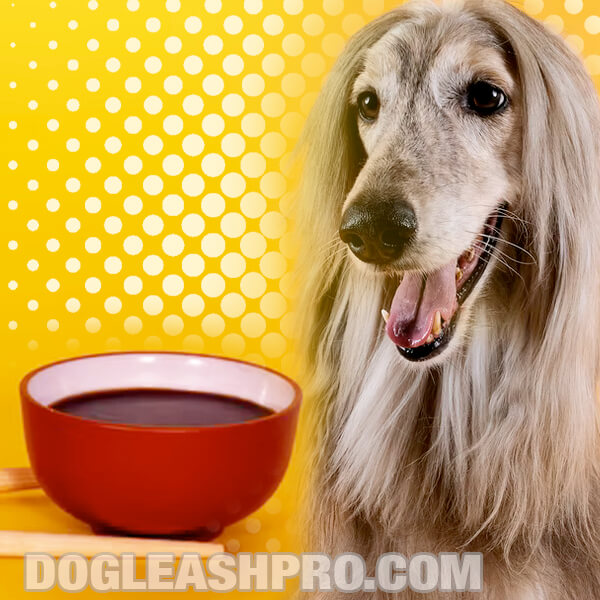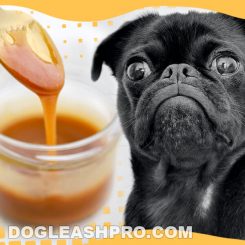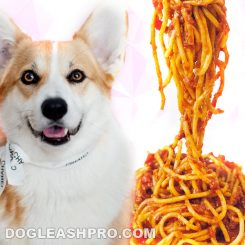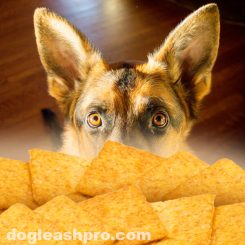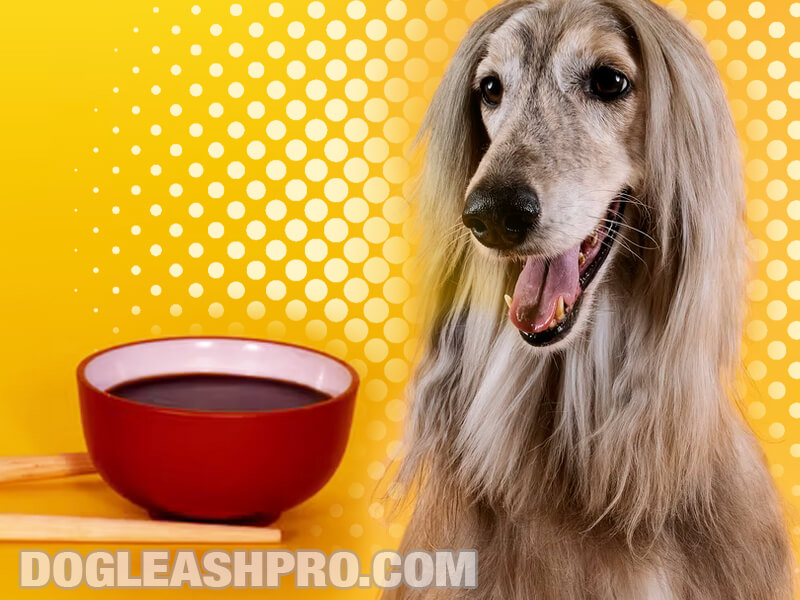
Can dogs eat Soy Sauce? No, dogs should not eat Soy Sauce due to its high sodium content. Additionally, your dog may be allergic or sensitive to some of the ingredients in Soy Sauce. If you do allow your dogs to lick some Soy Sauce off your plate, avoid making this a regular occurrence. Ingesting Soy Sauce regularly can lead to sodium poisoning which requires immediate medical attention.
You’re enjoying some sushi and dipping them in Soy Sauce when your dog comes running over and begging you for some with their puppy eyes. The sushi has Soy Sauce on it and you’re now wondering if Soy Sauce is safe for doggy consumption. Before you offer any food that contains Soy Sauce to your canine friends, you’ll want to read this article first. For now, here’s the short answer first.
Table of Contents
Can dogs have Soy Sauce?

No, dogs should not have Soy Sauce because it contains high sodium levels. Not only that, but Soy Sauce also contains other ingredients that our furry friends may be sensitive to, namely Soybeans and Wheat.
To fully understand why dogs should not have Soy Sauce, let’s briefly go over what Soy Sauce is, what it is made of, and its nutritional profile.
What is Soy Sauce?
Soy Sauce is a versatile sauce that’s used in many Chinese dishes. Here are three ways you can use Soy Sauce:
- You can use Soy Sauce by itself as this liquid sauce can be used as a dip or condiment.
- Or, you can pour a little bit of this liquid sauce directly over the food to give the food an extra kick of flavor and salt.
- Many cooks add Soy Sauce to the food they’re cooking to give the dish that salty and soy flavor, dark visual appeal, and a bit of moisture.
So, what’s so special about Soy Sauce? And what is it made of that gives it that tasty flavor? Let’s discuss this next.
What is Soy Sauce made of?
All Soy Sauce share the same main five ingredients:
- Soybeans.
- Wheat.
- Salt.
- Water.
- Fermenting agent (usually yeast).
READ ALSO: Can Dogs Eat Kimchi? The Spicy Truth!
Let’s find out why some of these ingredients may be harmful to dogs.
Is Soy Sauce bad for dogs?

Yes, Soy Sauce can be bad for dogs since some of the ingredients in Soy Sauce may not be safe for your four-legged friends.
So, is Soy Sauce harmful to dogs? Yes, Soy Sauce can be harmful to some dogs, depending on their current health conditions and whether or not they are sensitive or allergic to the ingredients in Soy Sauce.
Let’s go over these ingredients and see how they can affect your furry friend’s health.
Soybeans in Soy Sauce is harmful to dogs with soy allergies
While Soybeans are not directly toxic or poisonous to dogs, some dogs may be sensitive or allergic to Soybeans. It’s important to note that most of the Soybeans you buy today are genetically modified or GMO. They are low-quality beans and may not contain the nutrients you were expecting. This means that the Soybeans aren’t as healthy as you may think.
Therefore, be careful with how many Soybeans you’re offering your dog since Soybeans aren’t a necessary component of your dog’s natural diet.
If you really want natural and nutritious Soybeans, you may want to try to grow them yourself. If you’re not able to, buy from a local farmer you trust.
As we can see, Soybeans aren’t actually nutritious for our K9 friends.
Additionally, Soybeans can cause soy allergies in dogs. In fact, one of the most well-known allergens in dogs is soy.
If you know your dog is sensitive to or allergic to Soy products, avoid feeding them Soybeans or Soy products like Soy Sauce.
For those who are unsure whether their dogs have soy allergies, we highly recommend that you consult your dog’s vet. He or she will let you know whether your pooch has any allergies including soy allergies. Some vets will administer tests to confirm whether your furry friends have soy allergies.
When it comes to introducing new food to your K9 pals, be sure to introduce the food in a very small amount, slowly and gradually. Right after consuming the new food, monitor your pooch carefully to see if he or she shows any sign of allergic reactions or symptoms.
Some signs and symptoms of soy allergy in dogs include:
- Vomiting.
- Passing lots of gas.
- Bloating causes extreme discomfort.
- Diarrhea.
- Seborrhea or discharge of sebum.
- Eyelids inflammation or blepharitis.
- Excessive licking causes hair or coat to fall out.
- Chronic ear infections (some dogs may scratch their ears a lot or shake their head)
- Secondary ear infection with yeast or bacteria.
- Pyoderma, which requires antibiotic treatment.
Soybeans are also high in purines. When dogs consume high amounts of purines, their body digests it and produce uric acid, a waste product. When uric acid builds up, it can cause gout (arthritis) in dogs and affect the dog’s joint.
Your pooch may experience sudden swelling, pain, tenderness, and redness in one or more of his joints. The pain can sometimes be extremely painful and intolerable.
Also, Soybeans are high in silicates which can cause silica stones to form. When dogs consume way too many Soybeans, they may also have seizures.
If you know your furry family member suffers from hypothyroidism, do not feed him any Soybeans or Soy products since ingesting Soybeans can lead to low thyroid hormone levels.
For these reasons, avoid intentionally feeding your dog Soybeans. They aren’t a natural part of a dog’s diet and if your pooch has soy allergies, avoid Soybeans at all costs.
You may also like: Can Dogs Eat Bean Sprouts?
Wheat in Soy Sauce is harmful to dogs with wheat allergies
Wheat is the second main ingredient in Soy Sauce. If you know your dog is allergic to wheat products, avoid Soy Sauce at all costs.
Dogs with a wheat allergy may experience the following symptoms:
- Itchy skin.
- Itchy face causes your dog to rub his face on carpet and furniture.
- Dragging their bottom across the floor because their behind itches.
- Head shaking more than usual.
- Ear inflammation.
- Sneezing more than usual.
- Difficulty breathing.
- Vomiting.
- Diarrhea.
- Excessively licking his front paws.
- Changes in behavior.
- Flatulence or buildup of gas in your dog’s colon and intestinal tract.
- Seizure (in severe cases).
As we can see, canines that suffer from wheat allergy may have coat and skin issues. Most dogs are not born with wheat allergies. It can appear suddenly when dogs regularly eat wheat products, including Soy Sauce.
If you suspect your canine family member has wheat allergies, contact your vet right away and avoid feeding him any more wheat products which include Soy Sauce.
Salt in Soy Sauce can cause sodium poisoning in dogs
A high amount of sodium or salt content in Soy Sauce is one of the main reasons why dog owners shouldn’t give their canine friends Soy Sauce.
Let’s take a look at the nutritional profile of just 1 tablespoon or 16 grams of Soy Sauce.
Nutritional profile of Soy Sauce (from soy and wheat), 1 tablespoon or 16 grams
| Name, Unit | Amount |
| Calories, cal | 8.48 |
| Water, g | 11.4 |
| Sugar, g | 0.064 |
| Sodium, mg | 878 |
| Carbohydrate, g | 0.789 |
| Total Fat, g | 0.091 |
| Protein, g | 1.3 |
| Fiber, g | 0.128 |
| Calcium, mg | 5.28 |
| Iron, mg | 0.232 |
| Magnesium, mg | 11.8 |
| Phosphorus, mg | 26.6 |
| Potassium, mg | 69.6 |
| Zinc, mg | 0.139 |
| Copper, mg | 0.007 |
| Manganese, mg | 0.163 |
| Selenium, µg | 0.08 |
| Thiamin, mg | 0.005 |
| Riboflavin, mg | 0.026 |
| Niacin, mg | 0.352 |
| Pantothenic acid, mg | 0.048 |
| Vitamin B-6, mg | 0.024 |
| Folate, µg | 2.24 |
As we can see, in just one tablespoon or 16 grams of Soy Sauce, there is 878 mg of sodium. While that may not be a lot of salt for us, it is certainly a lot of salt for our canine friends.
Keep in mind that dogs only need between 0.25 grams to 1.5 grams of salt for every 100 grams of food and that dogs will have already received their daily salt intake limit from their main meal. Thus, consuming over the daily salt limit can put them at risk for salt poisoning.
Signs and symptoms of sodium poisoning in dogs include:
- Extreme thirst (make sure to always provide your pooch with a bowl of cool freshwater).
- Excessive urination.
- Headache.
- Nausea leading to vomiting.
- Upset stomach.
- Loss of appetite.
- Watery and loose diarrhea.
- Swollen tongue and lips.
- Fluid buildup in the body.
- Convulsions.
- Confusion.
- Lethargic.
- High fever.
- Loss of coordination causes dogs to walk in circles or lose their balance.
- Difficulty breathing or breathing too fast.
- Muscle spasm and weakness.
- Increased heart rate or tachycardia.
If you suspect your pooch has sodium poisoning, we highly recommend that you contact your vet immediately. Salt poisoning requires immediate medical attention and timely diagnosis and treatment are both necessary.
At the veterinary hospital, the vet may administer oxygen, electrolytes, and IV fluid therapy to keep your pooch hydrated. Some dogs may be required to stay in the hospital overnight or take prescribed medication.
It’s very easy for dogs to lick up a tablespoon of Soy Sauce so make sure to keep this sauce out of your dog’s reach.
Dogs with existing health conditions like kidney failure or disease should avoid Soy Sauce since high salt intake from this sauce can cause their blood pressure level to rise and this may worsen their kidney function.
So, is Soy Sauce ok for dogs?
As you can see, Soy Sauce is not ok for dogs. Try not to intentionally feed your dog Soy Sauce or allow your pooch to consume more than a lick of Soy Sauce.
That’s because Soy Sauce is made for human consumption and not for doggy consumption. When dogs consume a lot of Soy Sauce, they are at risk of sodium poisoning. Dogs with health issues like kidney failure or liver failure should stay away from Soy Sauce.
Additionally, dogs that are sensitive or allergic to wheat or soy products should definitely stay away from Soy Sauce.
Is Soy Sauce good for dogs?
Soy Sauce isn’t really good for dogs.
Although we do see a list of vitamins and minerals that Soy Sauce provides such as vitamin B6, protein, fiber, calcium, iron, folate, and magnesium to name a few, the truth of the matter is that the harmful effects of consuming Soy Sauce far outweigh any positive health benefits that this sauce will provide to our furry friends.
Also, our furry family members can receive these same nutrients from their regular healthy, well-balanced, and nutritious dog food. Evidently, there’s no need for dogs to consume Soy Sauce. Rather, they should stick to their regular doggy food and treats.
My Dog Ate Soy Sauce! What to do if my dog ate Soy Sauce?
If your dog ate Soy Sauce packet or lick some Soy Sauce off the sauce dish, you’ll want to monitor him or her very closely. Find out when your pooch consumes the Soy Sauce and be sure to observe him closely for the next 12 to 24 hours.
You’ll also want to find out how much Soy Sauce your dog ingested.
If your pooch shows any changes in behavior or the above signs and symptoms, you’ll want to call the vet immediately and take him there. Inform the vet how much Soy Sauce was ingested and at what time.
Since the Soy Sauce is very salty, it’s normal for dogs to linger near the water bowl right after and drink a lot of water. This is actually a good thing because it will help them flush out all that salt they’ve consumed from their body. Drinking a lot of water means you’ll see them peeing a lot too.
So, can dogs eat Soy Sauce?
All of the above reasons are why dog owners need to keep Soy Sauce and Soy Sauce packets away from their precious pooch. Taking necessary precautions is key to avoiding any health risks and high unexpected emergency bills.
DISCLAIMER: THIS WEBSITE DOES NOT PROVIDE MEDICAL ADVICE
The information, including but not limited to, text, graphics, images and other material contained on this website are for informational purposes only. No material on this site is intended to be a substitute for professional veterinary advice, diagnosis, or treatment. Always seek the advice of your veterinarian or other qualified health care provider with any questions you may have regarding dietary needs.
Resources:
https://en.wikipedia.org/wiki/Soy_sauce
https://www.petpoisonhelpline.com/poison/salt/

With over five years of specialized experience as an animal writer, my expertise lies in dog nutrition, health, behavior, grooming, and training. I am dedicated to delivering helpful and informative content that caters to the well-being of our furry friends. My primary goal is to empower pet owners with knowledge and ensure our canine companions thrive in health and happiness. In my free time, I love volunteering at local dog rescue centers.
